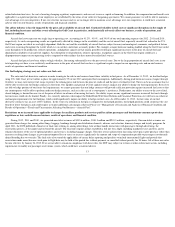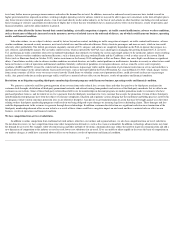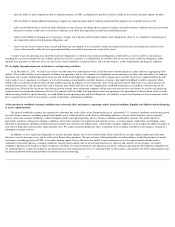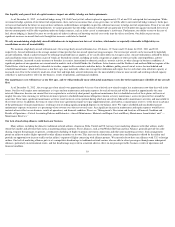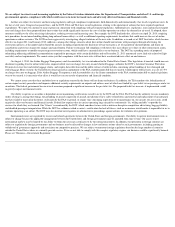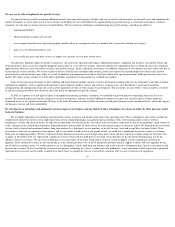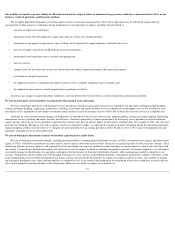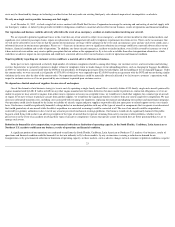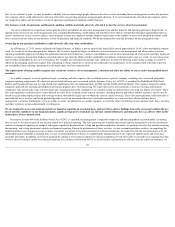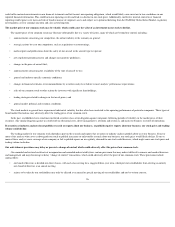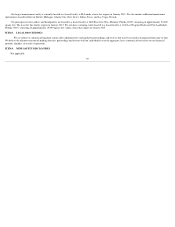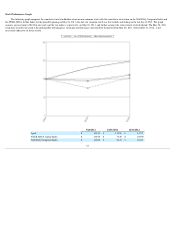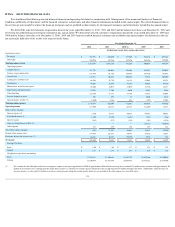Spirit Airlines 2012 Annual Report Download - page 24
Download and view the complete annual report
Please find page 24 of the 2012 Spirit Airlines annual report below. You can navigate through the pages in the report by either clicking on the pages listed below, or by using the keyword search tool below to find specific information within the annual report.
serve may be threatened by changes in technology or other factors that may make our existing third-party sales channels impractical, uncompetitive, or obsolete.
We rely on a single service provider to manage our fuel supply.
As of December 31, 2012 , we had a single fuel service contract with World Fuel Services Corporation to manage the sourcing and contracting of our fuel supply with
our third-party vendors. A failure by this provider to fulfill its obligations could have a material adverse effect on our business, results of operations and financial condition.
Our reputation and business could be adversely affected in the event of an emergency, accident or similar incident involving our aircraft.
We are exposed to potential significant losses in the event that any of our aircraft is subject to an emergency, accident, terrorist incident or other similar incident, and
significant costs related to passenger claims, repairs or replacement of a damaged aircraft and its temporary or permanent loss from service. There can be no assurance that
we will not be affected by such events or that the amount of our insurance coverage will be adequate in the event such circumstances arise and any such event could cause a
substantial increase in our insurance premiums. Please see “—Increases in insurance costs or significant reductions in coverage could have a material adverse effect on our
business, financial condition and results of operations.” In addition, any future aircraft emergency, accident or similar incident, even if fully covered by insurance or even if
it does not involve our airline, may create a public perception that our airline or the equipment we fly is less safe or reliable than other transportation alternatives, which
could have an adverse impact on our reputation and could have a material adverse effect on our business, results of operations and financial condition.
Negative publicity regarding our customer service could have a material adverse effect on our business.
In the past we have experienced a relatively high number of customer complaints related to, among other things, our customer service, and reservations and ticketing
systems. In particular, we generally experience a higher volume of complaints when we make changes to our unbundling policies, such as charging for baggage. In addition,
in 2009, we entered into a consent order with the DOT for our procedures for bumping passengers from oversold flights and our handling of lost or damaged baggage. Under
the consent order, we were assessed a civil penalty of $375,000, of which we were required to pay $215,000 based on an agreement with the DOT and our not having similar
violations in the year after the date of the consent order. Our reputation and business could be materially adversely affected if we fail to meet customers’ expectations with
respect to customer service or if we are perceived by our customers to provide poor customer service.
We depend on a limited number of suppliers for our aircraft and engines.
One of the elements of our business strategy is to save costs by operating a single-family aircraft fleet - currently Airbus A320-family, single-
aisle aircraft, powered by
engines manufactured by IAE. If Airbus or IAE (or any other engine manufacturer for future deliveries) becomes unable to perform its contractual obligations, or if we are
unable to acquire or lease aircraft or engines from other owners, operators or lessors on acceptable terms, we would have to find other suppliers for a similar type of aircraft
or engine. If we have to lease or purchase aircraft from another supplier, we would lose the significant benefits we derive from our current single fleet composition. We may
also incur substantial transition costs, including costs associated with retraining our employees, replacing our manuals and adapting our facilities and maintenance programs.
Our operations could also be harmed by the failure or inability of aircraft, engine and parts suppliers to provide sufficient spare parts or related support services on a timely
basis. Our business would be significantly harmed if a design defect or mechanical problem with any of the types of aircraft or components that we operate were discovered
that would ground any of our aircraft while the defect or problem was corrected, assuming it could be corrected at all. The use of our aircraft could be suspended or
restricted by regulatory authorities in the event of any actual or perceived mechanical or design problems. Our business would also be significantly harmed if the public
began to avoid flying with us due to an adverse perception of the types of aircraft that we operate stemming from safety concerns or other problems, whether real or
perceived, or in the event of an accident involving those types of aircraft or components. Carriers that operate a more diversified fleet are better positioned than we are to
manage such events.
Reduction in demand for air transportation, or governmental reduction or limitation of operating capacity, in the South Florida, Caribbean, Latin American or
Northeast U.S. markets could harm our business, results of operations and financial condition.
A significant portion of our operations are conducted to and from the South Florida, Caribbean, Latin American or Northeast U.S. markets. Our business, results of
operations and financial condition could be harmed if we lost our authority to fly to these markets, by any circumstances causing a reduction in demand for air
transportation, or by governmental reduction or limitation of operating capacity, in these markets, such as adverse changes in local economic or political conditions, negative
23


